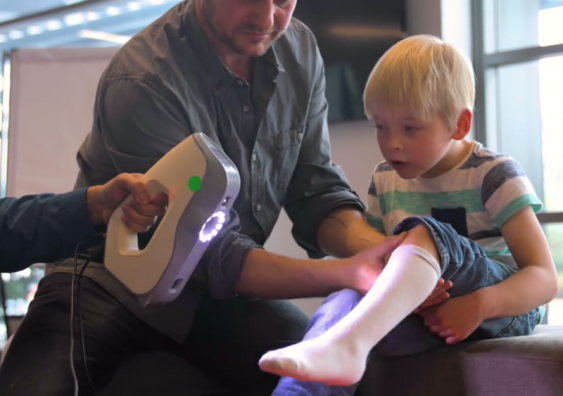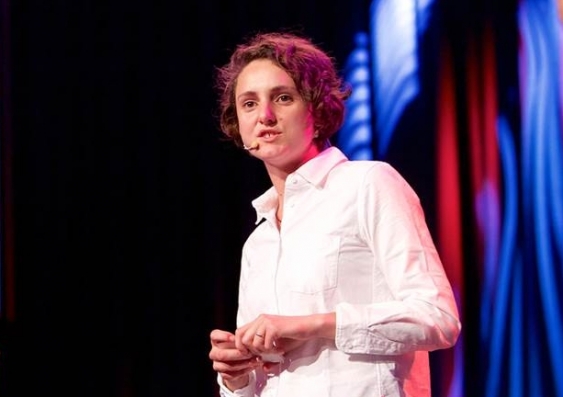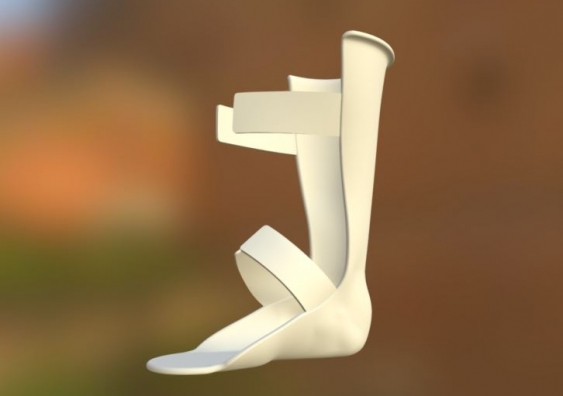3D printed "magic shoes" make life easier for kids with disabilities
Entrepreneur Melissa Fuller from the UNSW Michael Crouch Innovation Centre is 3D-printing low-cost mobility braces for children with disabilities.
Entrepreneur Melissa Fuller from the UNSW Michael Crouch Innovation Centre is 3D-printing low-cost mobility braces for children with disabilities.

Leilah Schubert
Media Office
9385 8107 or 0410842427
l.schubert@unsw.edu.au
At 17, Melissa Fuller left her Western Sydney high school with no idea about what she wanted to do.
Twelve years later, she is co-founder of AbilityMate, an entrepreneurial group of designers, engineers and allied health professionals who use 3D printing to manufacture customised posture and mobility equipment for children with disabilities. The company has dubbed the innovation “Magic Shoes”.
The design and manufacture of these ankle and foot orthoses is poised to be faster and cheaper than traditionally manufactured support boots and shoes.
Melissa also spends two days a week at UNSW’s Michael Crouch Innovation Centre working with university students, alumni and staff who approach the centre with ideas for new inventions or processes.
Melissa started her working life in a very different setting. She had a part-time job sweeping the floor in a printing factory and made her own luck by learning every aspect of the business, from cutting posters to operating printing machines and managing clients.

Melissa Fuller giving a talk about AbilityMate. Photo: Supplied by Melissa Fuller
After 10 years, she decided she could no longer ignore the nagging doubts about the social and environmental impact of producing advertising graphics for products she felt people didn’t really need.
By then, 3D printing was radically changing the business landscape by creating durable, safe products cheaper and faster than traditional manufacturing.
“I saw 3D printing as my tool for changing the way we design and manufacture things,” says Melissa about her shift from mainstream business to the world of social entrepreneurs.
When she looks back at the path she took to get to this point, she’s not so surprised at how it worked out.
“My parents are very altruistic people. We come from humble beginnings in the Mt Druitt area and I tend to be quite entrepreneurial by spirit so for me to be a social entrepreneur is a perfect fit for my skills,” says Melissa.
With a couple of friends, she formed the Three Farm network and travelled around Australia teaching disadvantaged communities how to use 3D technology.
That led to the formation of Makers Place in the inner Sydney suburb of Waterloo, a community facility that provides people with access to the tools and equipment needed to fix things and invent new ones while sharing information and ideas with others at the centre.
Name: Melissa Fuller, Social Impact Facilitator at UNSW’s Michael Crouch Innovation Centre Innovation: 3D-printing of ankle and foot orthoses – “Magic Shoes” – for children with disabilities Enterprise: Co-founder of AbilityMate
It was here Melissa met Johan Du Plessis, who was working with people with disabilities and realised his engineering experience could help solve some of the problems they faced.
And so AbilityMate was born.
Establishing a business more focused on a social outcome than profit is not without its challenges, Melissa says.
“When we started we were 3D printing everything for everyone and that was not sustainable,” she recalls.
With $20,000 of seed funding and access to an extensive mentor network from disability-focused impact accelerator Remarkable – a division of Cerebral Palsy Australia sponsored by Telstra and NSW Family & Community Services – the team realised they needed to focus on one area and do it well.
They chose 3D-printing of ankle and foot orthoses for children with disabilities.

Model of a 3D-printed ankle support. Photo: AbilityMate via riatiamaria on Sketchfab
Traditionally, making orthoses has been slow and expensive. Children suffered the discomfort of having their limbs set in plaster to make a cast, then manual fabrication of a shoe or boot could take weeks.
Today, a child’s limb can be scanned in seconds and 3D printing can produce a shoe within a couple of days, freeing orthotists to help more children.
AbilityMate recently launched a crowd-funding campaign to pay for things such as materials testing and Therapeutic Goods Administration approval, raising $97,000 in just one month from 310 community backers.
It was a “fantastic head start” for the company, which is continuing to raise money to complete medical trials of the “Magic Shoes”, upgrade one of its Sydney clinics and release open-source blueprints for the shoes.
The company is building an online platform based on the concept of designing globally and manufacturing locally. “Magic Shoes” will be the first product to be made available through AbilityMate’s platform where approved 3D printing hubs anywhere in the world can sign on and get paid to make assistive devices.
“We want to solve this problem for children with a disability, make money from the solution, invest that back into the business and share what we have learnt,” says Melissa.